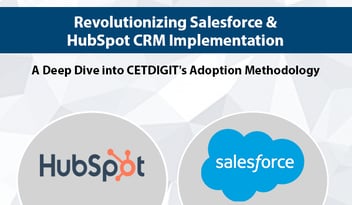The financial world is absolutely buzzing right now. What’s on the docket? New tariffs that may be introduced, lower interest rates, a new Fed Chair, and so much more. It’s a lot, actually. But beyond the headlines, financial firms face a bigger challenge: delivering standout client experiences while managing complex processes and decision-making. For beginners, there’s a massive wave of increased competition and with that comes heightened client expectations. To keep their current clients from “testing the waters,” many financial firms need the right tools to streamline operations and to promote personalized interactions.
This is where Salesforce Financial Services come in – a tailored CRM solution designed to address the unique needs of the finance industry. Today, we’ll run through why Salesforce can be the change you need for your financial service business, how it can transform the client relationships you’re struggling with, and the best practices for seamless Salesforce implementation for finance.
Why Financial Services Need a CRM Like Salesforce
A robust Financial Services CRM is simply a necessity. According to a study by Deloitte, 79% of wealth managers say that client-centricity is critical to their growth, yet only 14% believe their organization is truly client-centric. Salesforce addresses this gap by providing tools to manage relationships, track key metrics, and deliver proactive financial guidance.
Key Benefits of Salesforce for Financial Services:
- Client 360° View: Salesforce enables a unified view of all client data, from account details to transaction histories. This allows advisors to deliver personalized services, enhancing client trust and satisfaction.
- Automated Workflows: With Salesforce, repetitive tasks such as document processing and compliance tracking can be automated, freeing up time for value-added client interactions.
- Regulatory Compliance: The platform provides tools to streamline compliance workflows, ensuring firms meet evolving financial regulations without missing deadlines.
- Proactive Relationship Management: AI-powered insights from Salesforce help advisors anticipate client needs, whether it's portfolio adjustments or new investment opportunities.
Best Practices for Salesforce Implementation in Finance
Successfully adopting Salesforce requires a thoughtful approach to avoid common pitfalls and maximize ROI—it is, after all, reshaping how your firm works. Here are the steps to ensure a smooth Salesforce implementation for finance:
- Understand Your Goals: Clearly define your objectives upfront—whether it’s streamlining operations, improving client relationships, or increasing compliance efficiency.
- Data Migration Strategy: Ensure all client data is clean, consistent, and ready for migration into Salesforce. Poor data quality can derail even the best implementation plans.
- Customization for Finance: Tailor Salesforce features to align with financial services workflows. Tools like Financial Services Cloud are specifically designed to cater to advisors, wealth managers, and insurers.
- Training and Adoption: According to Forrester, businesses that prioritize CRM training see 37% higher ROI. Invest in comprehensive training for your team to ensure they leverage Salesforce to its fullest potential.
- Ongoing Optimization: Post-implementation, regularly audit your processes to identify areas for improvement. Salesforce evolves rapidly, and so should your usage of it.
Data-Driven Insights on Salesforce's Impact
Improved Client Retention Rates
A report from Nucleus Research found that organizations using Salesforce Financial Services Cloud experienced a 26% increase in client retention rates due to better relationship management and proactive services.
Enhanced Advisor Productivity
Salesforce claims its CRM improves advisor productivity by up to 32%, enabling professionals to handle larger client portfolios without compromising service quality. (Salesforce Impact Report)
Takeaways
When it comes to mastering Salesforce for financial services, it isn’t just adopting a new CRM; it’s a whole revolution as to how your firm engages with clients and pushes operations. From providing a 360° client view to automating compliance workflows, Salesforce enables financial professionals to focus on what truly matters: delivering exceptional value to their clients.
If you’re ready to take your firm to the next level, investing in a Financial Services CRM like Salesforce is a strategic move. With careful implementation and ongoing optimization, the benefits can significantly outweigh the costs – resulting in happier clients and stronger business outcomes.





Leave a Comment